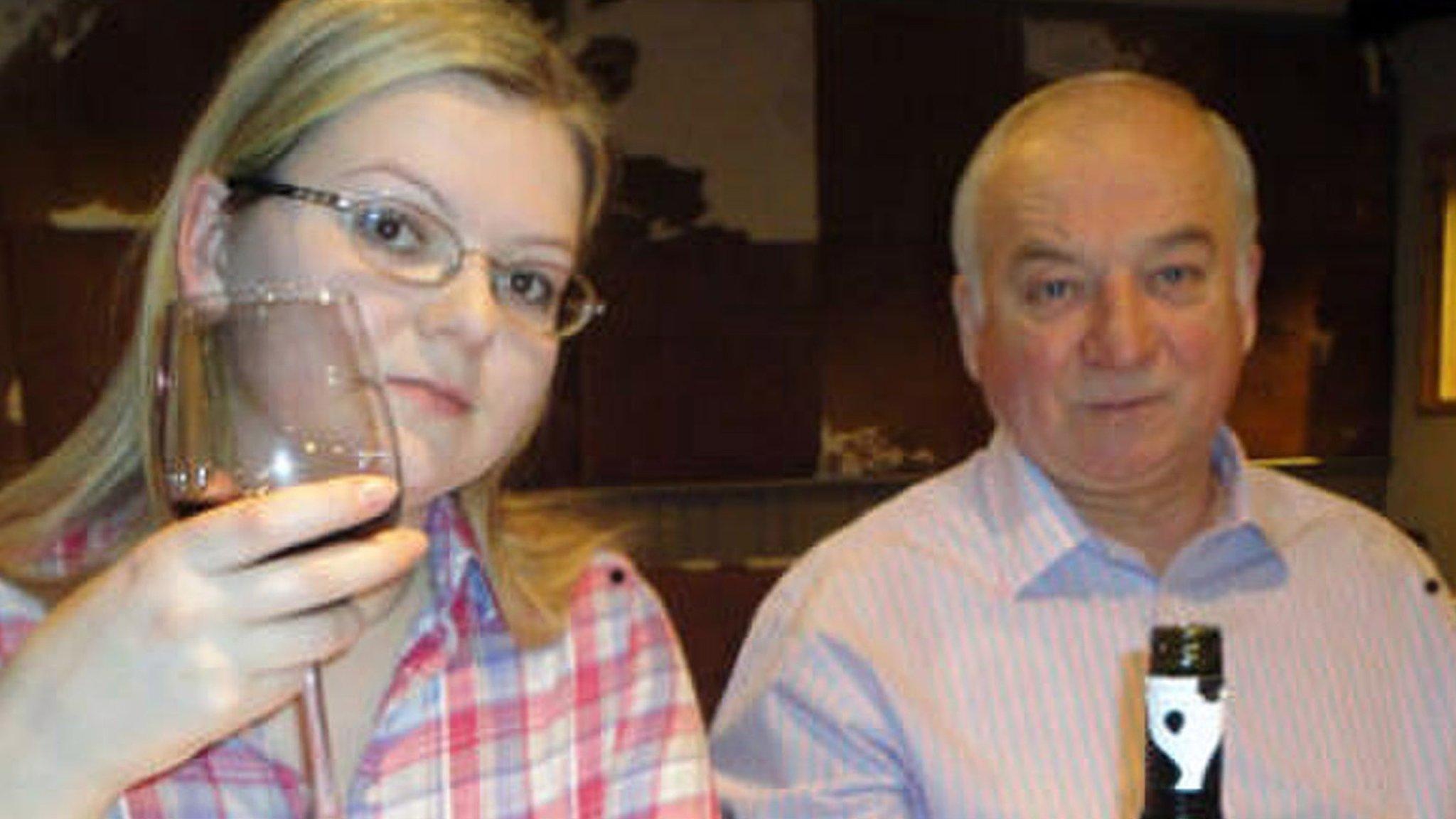Novichok: Amesbury poisoning couple 'had high dose'
- Published
Assistant Commissioner Neil Basu says police will do everything to bring those responsible to justice
A woman who died after being exposed to the nerve agent Novichok in Wiltshire is believed to have had a "high dose" of the substance, police have said.
Mother-of-three Dawn Sturgess, 44, died on Sunday evening after falling ill in Amesbury on 30 June.
Her partner, Charlie Rowley, 45, who was also exposed to the nerve agent, remains critically ill in hospital.
Police are continuing to hunt for a contaminated container which they believe was handled by the pair.
The BBC understands Mr Rowley's flat in Amesbury is regarded as the key location in the search. A team wearing hazmat suits is combing the small flat, working in 30-minute shifts because of the heat.
Wiltshire Police said on Monday night that a car had been moved from Swindon in relation to the investigation - but stressed that "the public should not be alarmed".
Allow X content?
This article contains content provided by X. We ask for your permission before anything is loaded, as they may be using cookies and other technologies. You may want to read X’s cookie policy, external and privacy policy, external before accepting. To view this content choose ‘accept and continue’.
'Main line of inquiry'
A murder inquiry has been launched into Ms Sturgess's death and a post-mortem examination is due to take place.
Home Secretary Sajid Javid chaired a meeting of the government's emergency committee Cobra on Monday and later addressed MPs.
He told them the death of Ms Sturgess "strengthens our resolve to find out exactly what happened and who is behind it".
Mr Javid said scientists had not yet been able to determine if the nerve agent in the latest poisoning was from the same batch as that used earlier this year in Salisbury.
Russian former spy Sergei Skripal and his daughter Yulia fell ill after being poisoned with Novichok in Salisbury. Ms Skripal was discharged from Salisbury District Hospital in April, and her father in May.
A police officer, Det Sgt Nick Bailey, was also left seriously ill after responding to the attack on the Skripals and spent nearly three weeks in hospital.
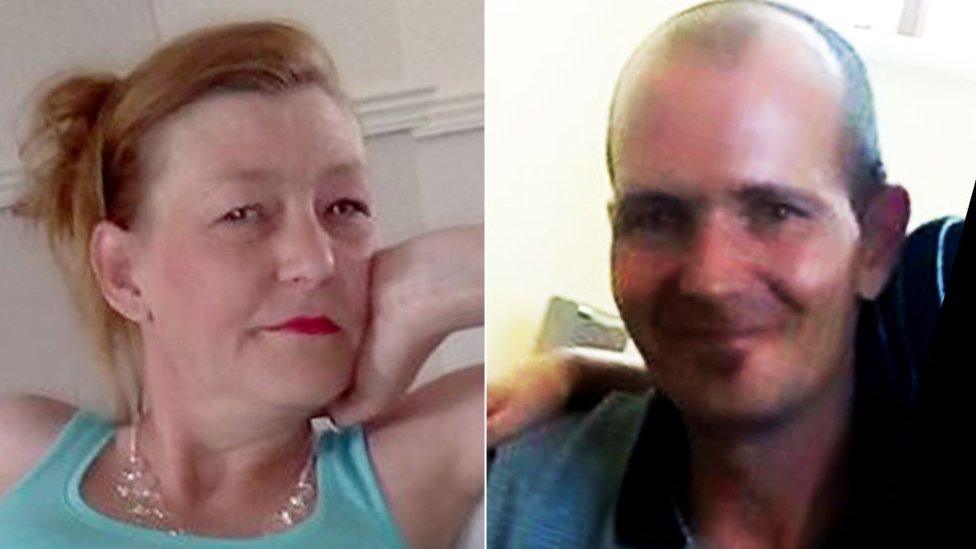
Dawn Sturgess and Charlie Rowley touched an unknown contaminated item with their hands, police say
Assistant Commissioner Neil Basu, the head UK counter-terrorism policing which is leading the investigation, said he was "unable to say" if the incident in Amesbury is linked to the poisoning of the Skripals on 3 March - but it is their "main line of inquiry".
Mr Basu said: "In the four months since the Skripals and Nick Bailey were poisoned, no other people besides Dawn and Charlie have presented with symptoms, but their reaction was so severe it resulted in Dawn's death and Charlie being critically ill.
Footage shows Ms Sturgess in Salisbury days before her collapse
"This means they must have got a high dose and our hypothesis is that they must have handled a container that we are now seeking."
It is understood the couple each had nerve agent on one of their hands.
PM 'appalled and shocked'
Ms Sturgess, from Durrington, was rushed to hospital on Saturday 30 June after becoming ill at a house in Muggleton Road in Amesbury.
She has two sons, aged 19 and 23, and an 11-year-old daughter.
Theresa May said she was "appalled and shocked" by her death. Speaking to MPs in the House of Commons, she also paid tribute to the "dedication of the staff" at Salisbury District Hospital and thanked them for their "tireless work".
Defence Secretary Gavin Williamson told MPs: "The simple reality is that Russia has committed an attack on British soil which has seen the death of a British citizen.
"That is something that I think the world will unite with us in actually condemning."
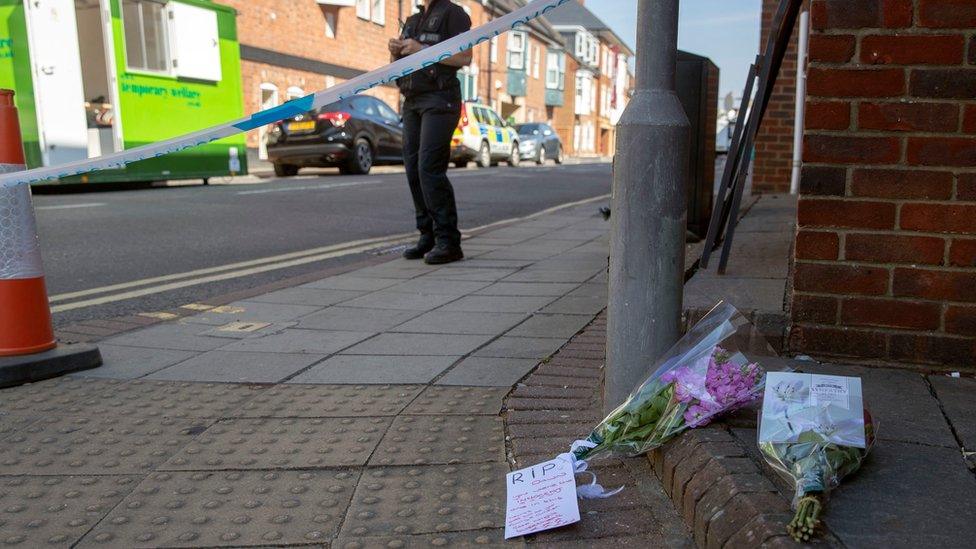
Tributes were left to Ms Sturgess, who has three children
Kremlin spokesman Dmitry Peskov said Russia was "deeply concerned" about the incident in Amesbury - but said accusations that it was involved are "absurd".
The UK government previously blamed Russia for the poisoning of the Skripals in March and say the nerve agent used was a type developed by Russia. Russian authorities denied any involvement in the poisoning.
Mr Basu said detectives will continue with their "painstaking and meticulous work to gather all the available evidence".

Analysis
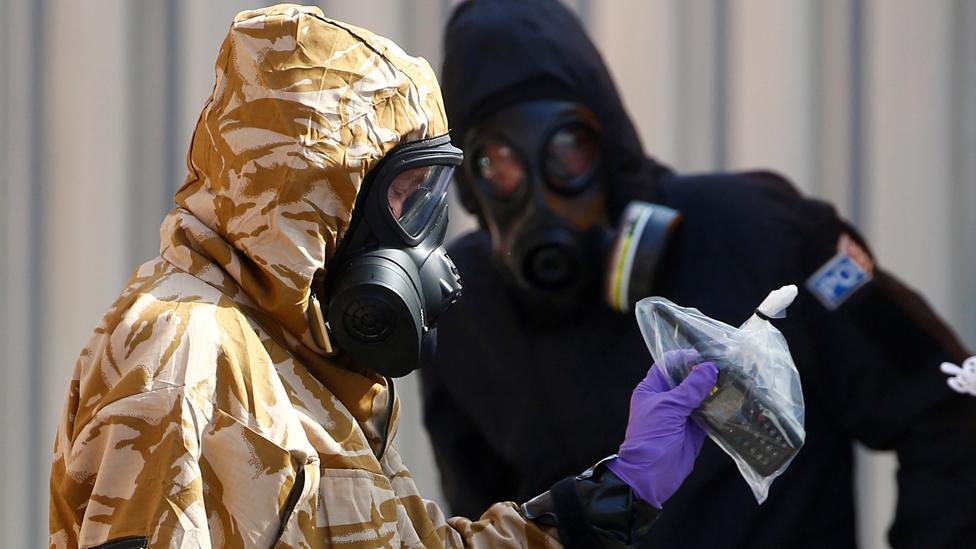
By Gordon Corera, BBC security correspondent
A hundred detectives are already working round the clock to try to establish how Dawn Sturgess and Charlie Rowley were contaminated by Novichok.
Swabs taken from them in hospital revealed the highest level of contamination on their hands, leading to the theory they picked something up.
It may well be that it was Dawn who came into first contact and Charlie received secondary contamination from her but that remains to be confirmed. The priority now is working out what that item was and where it is now.

Officers have found a red Ford Transit van which Mr Rowley travelled in with three other men before falling ill. The vehicle has been sent to the government's military research facility Porton Down.
Three men who also travelled in the van have shown no sign of being exposed to Novichok.
Meanwhile, the bus that Ms Sturgess and Mr Rowley used the night before they collapsed has tested negative for Novichok.
Public Health England said the risk to the general public "remains low" but warned people, external not to pick up "any strange items such as needles, syringes or unusual containers".
They have also offered advice for people who may have visited one of five areas identified by police.
Those locations are Muggleton Road, Boots pharmacy and the Baptist church in Amesbury, and John Baker House and Queen Elizabeth Gardens in Salisbury.
Anyone who was there between 22:00 BST on 29 June and 18:30 on 30 June should continue to follow advice, external, including washing their clothes in a washing machine, keeping other items double-bagged and securely fastened if they are dry-clean only.
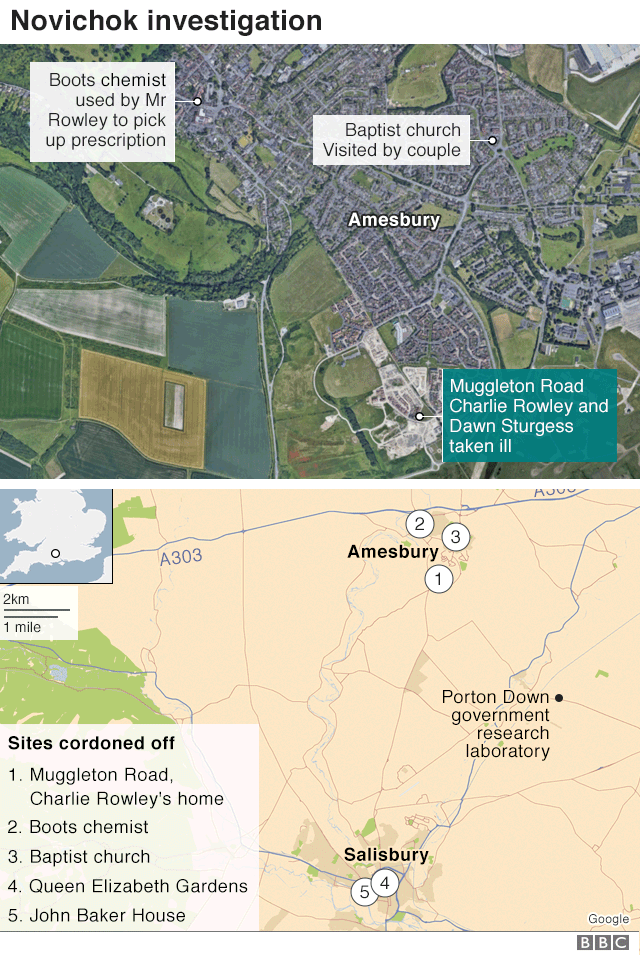

Wiltshire Police Chief Constable Kier Pritchard said the news of Ms Sturgess's death would "send a huge shockwave across our communities" but stressed that "the risk to the wider public remains low".
He praised residents for their "continual strength and resilience" during "these challenging times".

What happened when?
Friday 29 June
12:20 - Dawn Sturgess and Charlie Rowley are together at John Baker House, Salisbury. They leave to visit Salisbury and later go to Queen Elizabeth Gardens. They return to John Baker House at 16:20.
22:00 - The couple catch a bus to Amesbury. Police believe they then spend the night at Mr Rowley's home on Muggleton Road.
Saturday 30 June
10:15 - The South Western Ambulance Service is called to Mr Rowley's address as Ms Sturgess has been taken ill. Mr Rowley is also present at the address as Ms Sturgess is taken to hospital.
12:00 - Mr Rowley visits the Boots pharmacy on Stonehenge Walk in Amesbury, returning to his house half an hour later.
1:45 - He goes to the Amesbury Baptist Church on Butterfield Drive, returning home at 15:00.
18:20 - Mr Rowley is taken ill. The ambulance service is called to his address and he is taken to hospital.
Sunday 8 July
20:26 - Ms Sturgess dies in hospital.
- Published2 August 2018
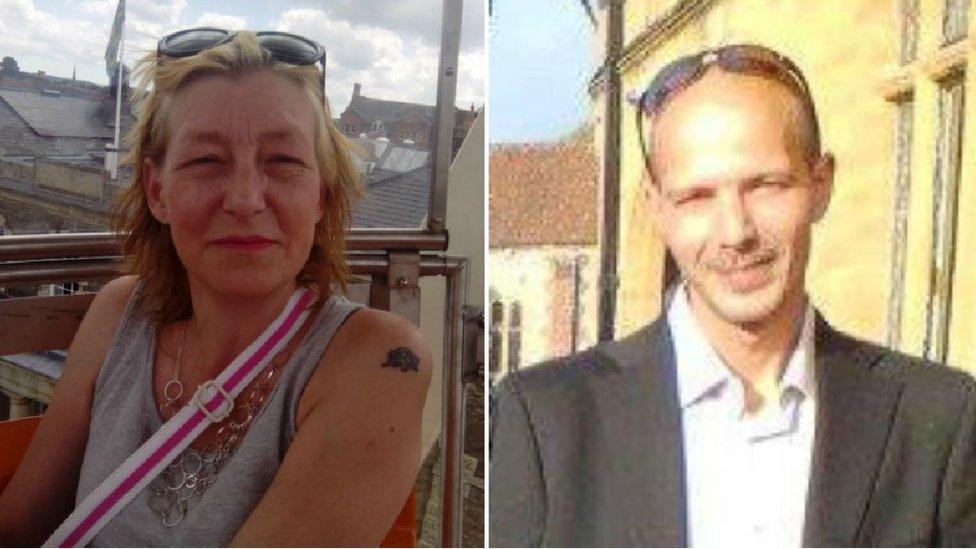
- Published2 September 2020
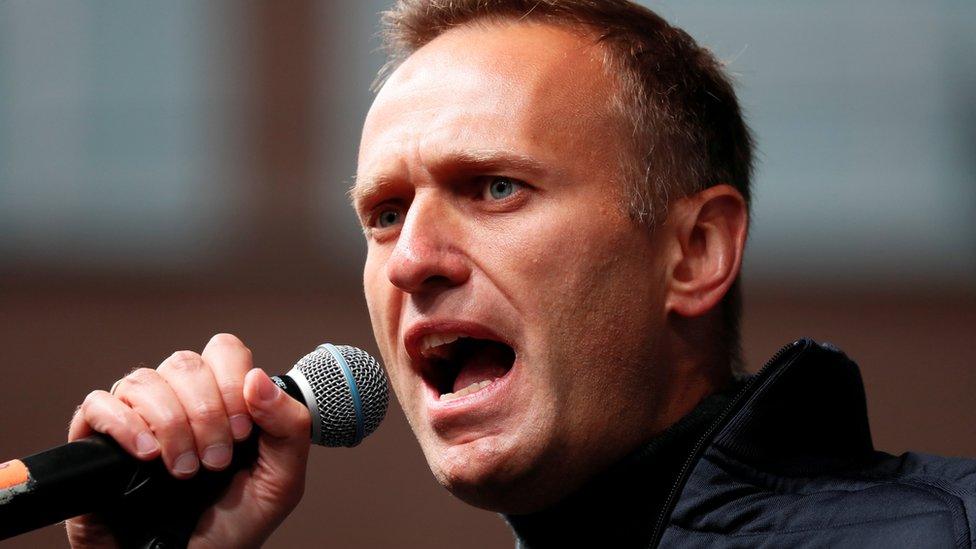
- Published27 September 2018
